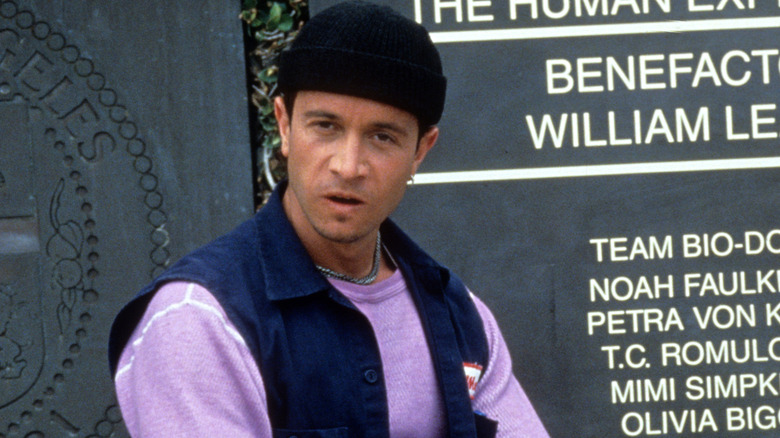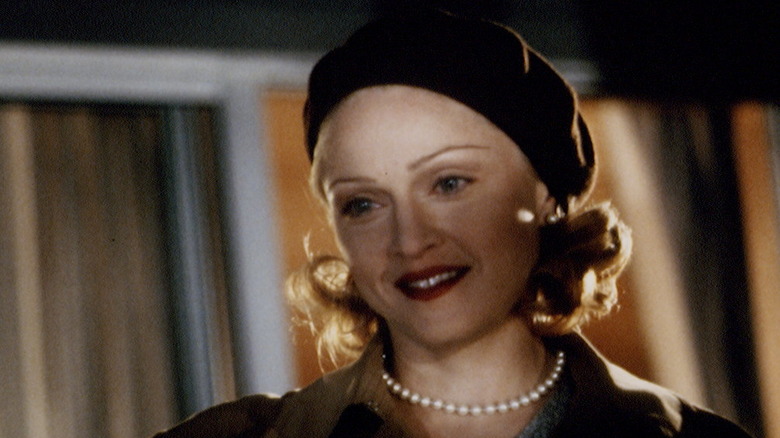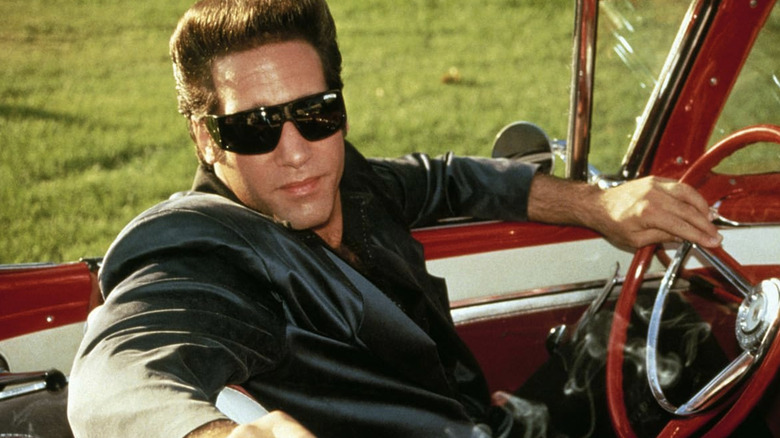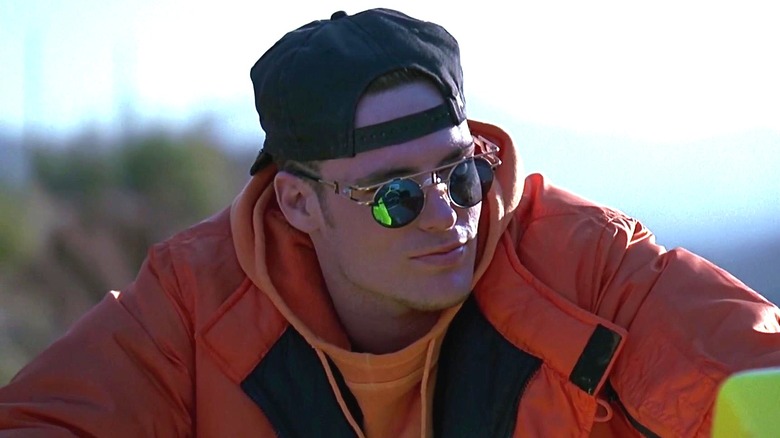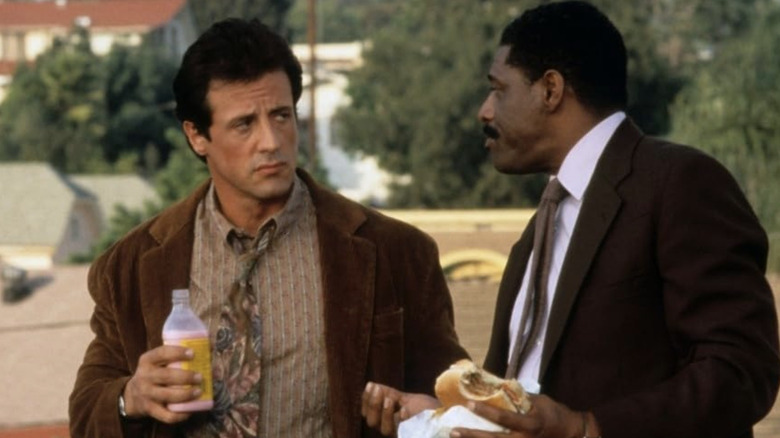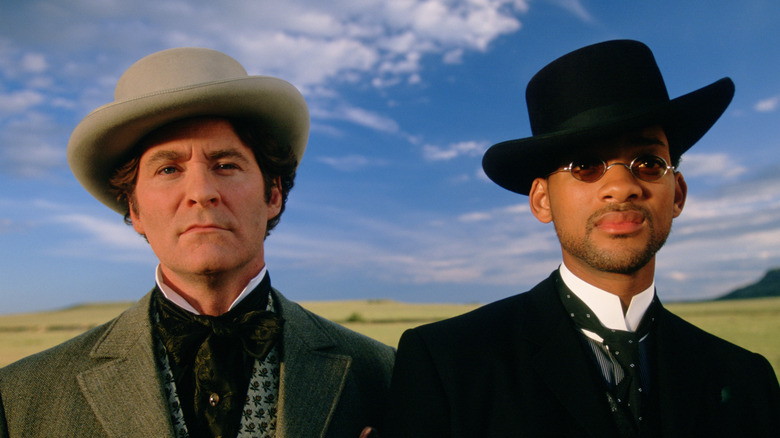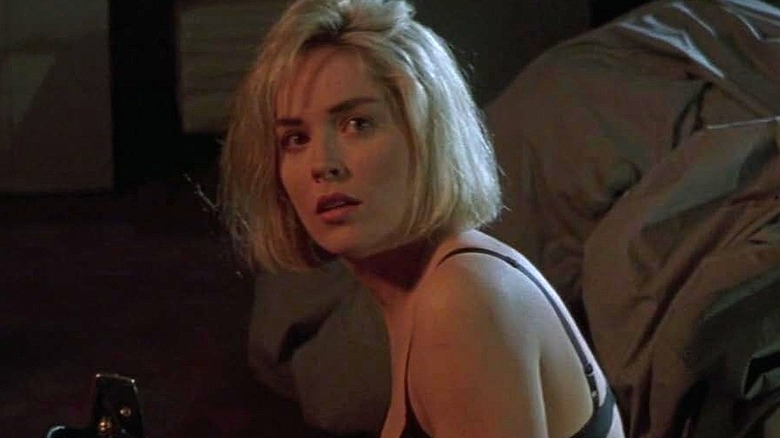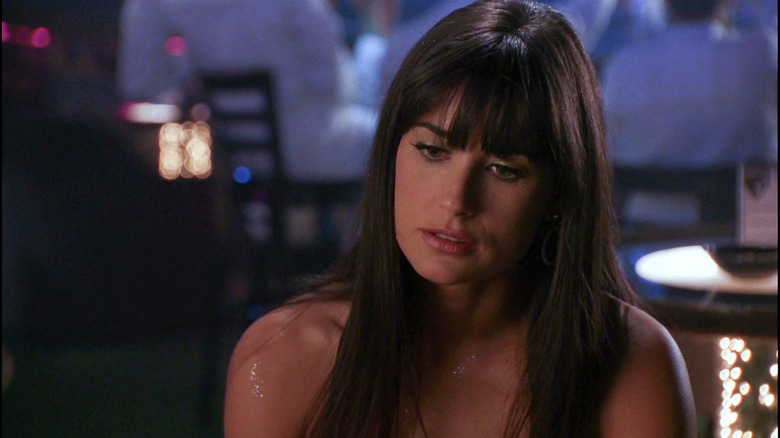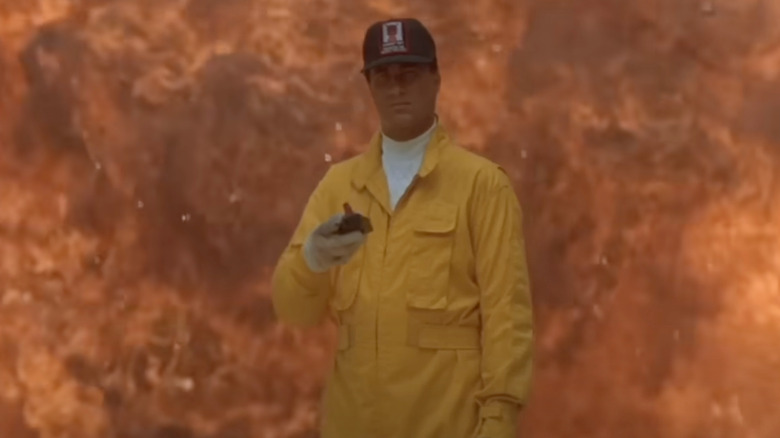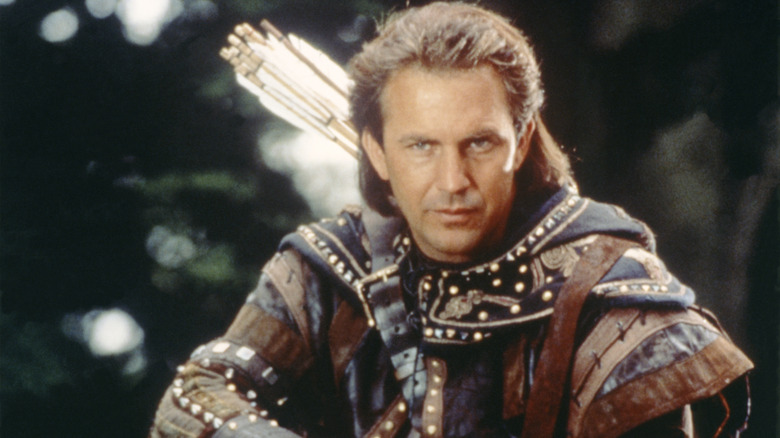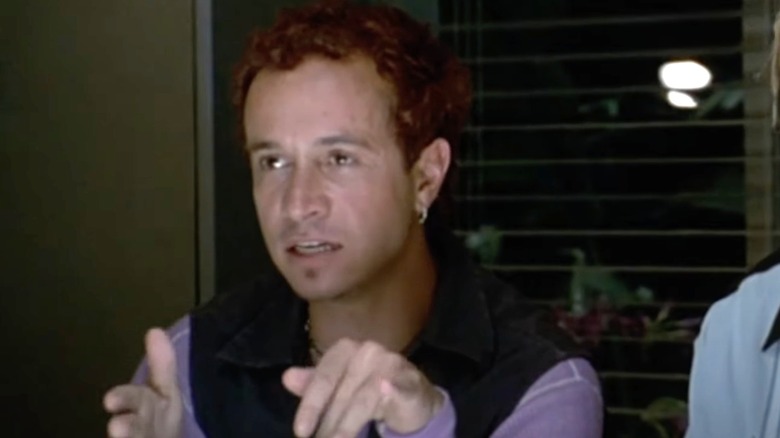The 10 Worst Acting Performances Of The '90s
The 1990s were a peak time for movie buffs. Best picture winners during the decade included "Driving Miss Daisy," "The Silence of the Lambs," "Schindler's List," and "Forrest Gump," and there were standout individual performances as well. Tom Hanks won back-to-back best actor Oscars for "Philadelphia" and "Forrest Gump" in 1994 and 1995, and Nicholas Cage won the next year for "Leaving Las Vegas." Best actress winners included Holly Hunter for "The Piano," Susan Sarandon in "Dead Men Walking," and Frances McDormand in "Fargo" — but we're not here to talk about these impressive accomplishments.
For every '90s masterpiece like "The Shawshank Redemption," "Jackie Brown," or "Good Will Hunting," there were stinkers like "Johnny Mnemonic," "Cool World," and "Major Payne." Some of the decade's duds had an awful premise or hackneyed screenplay, while others were cursed with questionable acting performances. Some of these performances are from action stars who couldn't make the jump to comedy, while others feature actors who failed to make anything watchable out of a terrible script.
Madonna - Body of Evidence
Madonna was a dominant force on the '80s pop charts, and she was peaking as the '90s began, earning $39 million in 1990 (equal to over $95 million today), making her the highest-earning female entertainer on the planet. She began acting in short and independent films in the '70s and starred in 1985's "Desperately Seeking Susan" as her musical career took off. Madonna also played outfielder Mae Mordabito in the 1992 hit comedy "A League of Their Own," but that might have been her Hollywood high point. The following year saw the release of "Body of Evidence," for which Madonna won the Golden Raspberry award for worst actress. The film also picked up Razzie nominations for worst picture, worst actor (Willem Dafoe), worst supporting actress (Anne Archer), and worst director (Uli Edel).
Madonna starred in the pseudo-erotic thriller (or maybe erotic pseudo-thriller) as Rebecca Carlson, a woman accused of murder by lovemaking. The decade was packed with similar adult-oriented mainstream films that featured plenty of nudity, but this one sits near the unwatchable end of that spectrum. "Body of Evidence" has an 8% rating from critics and 23% from viewers at Rotten Tomatoes, and David Denby of New York Magazine panned Madonna's performance. He referred to her as "a hot bore, a terrible naked actress" before spreading some of the blame around to Edel, scriptwriter Brad Mirman, and cinematographer Doug Milsome. While Madonna's general sex symbol status hardly took a hit from the film, it earned less than $14 million on an estimated budget of more than twice that.
Andrew Dice Clay - The Adventures of Ford Fairlane
When '90s filmmakers weren't turning out borderline softcore pornography, they were greenlighting films featuring polarizing stars. Andrew Dice Clay made his name as a vulgar standup comedian, and that was the persona he brought to the big screen. Clay appeared on "M*A*S*H" and "Diff'rent Strokes" in the early '80s and had a minor role in "Pretty in Pink" before landing a 17-episode arc on the late-'80s series "Crime Story." As his comedy star began to shine brightly, he took his shot at the big screen with 1990's "The Adventures of Ford Fairlane," starring in the title role as a foul-mouthed private investigator who works adjacent to the music industry.
The film was one of the worst of the decade, earning Razzie awards for worst picture and worst actor (Clay). It also picked up additional nominations for director Renny Harlin and both Wayne Newton and Gilbert Gottfried as worst supporting actor. This flaming dumpster fire was nothing but a showcase for the Diceman, who earned his Razzie with a performance that was as uninspired as it was predictable. Roger Ebert gave the film one star and observed the glaring similarities between the title character and Clay's comic persona. "In a club or on a stage, foul-mouthed and race-baiting, he implicates the audience, and they laugh in order to exclude themselves as his targets," Ebert wrote. "But a movie audience is more separate, more contemplative — and, sitting in the dark, watching him, more likely to be appalled than entertained."
Vanilla Ice - Cool as Ice
Vanilla Ice was another genre-jumping star who tried to make the move to the big screen, but you'd be forgiven if you don't remember his 1991 bomb "Cool as Ice." Ice won the Razzie as worst new star while earning a nomination for worst actor along with the film's nods for worst picture, worst director (David Kellogg), and worst screenplay (David Stenn). Ice stars as Johnny, a motorcycle-riding rapper who wins the heart of a local honor student with his bad-boy antics. It has a woeful 3% Tomatometer from reviewers and an inexplicable 43% Popcornmeter rating from fans on Rotten Tomatoes, proving that we might be better off leaving reviewing movies to the professionals.
Matthew Gilbert of the Boston Globe is one such pro who dismissed the performance as vapid, writing, "The man whom promoters call the rap-era Elvis has negative charisma." Ice spends most of the film on his yellow motorcycle or behind a microphone, and his fashion choices are the most entertaining thing about this travesty. According to Cracked, Ice claims to have been paid $1 million for the film, which accounted for a sizable chunk of its $6 million budget. The movie made less than $1.2 million in theaters, so maybe the rapper should have written Universal a refund check.
Sylvester Stallone - Stop! Or My Mom Will Shoot
After Sylvester Stallone made his career by being nominated for the best actor Oscar in 1977 for the self-scripted "Rocky," he built his career playing tough guys like Rocky Balboa and John Rambo. "Rocky V" was released in 1990, right before Stallone gave the character a 16-year break, and he immediately tried his hand at comedic roles, starring as a gangster in "Oscar" and a cop in "Stop! Or My Mom Will Shoot" the following year.
Both films were supposed to be crime comedies, but Stallone was clearly out of his element trying to elicit laughs from his fans. To call his performance in the latter film "wooden" would be an insult to majestic trees everywhere, with audiences and critics getting their biggest laughs at Stallone's expense. Roger Ebert, who generously awarded it a half star out of four, had little positive to say about the movie. "It is moronic beyond comprehension," Ebert wrote, "an exercise in desperation during which even Sylvester Stallone, a repository of self-confidence, seems to be disheartened. The Golden Raspberry committee shared Ebert's assessment, honoring the film with Razzies for worst actor (Stallone), worst supporting actress (Estelle Getty), and worst screenplay in 1993.
The movie has a 14% Tomatometer score from critics and a marginally better 22% Popcornmeter rating from audiences at Rotten Tomatoes, and Stallone made his own feelings about his work that year clear in a 2006 Q&A with Ain't it Cool News. When asked if there were any films he wished he had not appeared in, he immediately mentioned "Stop! Or My Mom Will Shoot!" and "Oscar." After these two disasters, Stallone immediately slid back into his comfortable action hero roles, starring in "Cliffhanger" and "Demolition Man" in the following two years. "Stop! Or My Mom Will Shoot" cost more than $40 million to produce — and somehow managed to earn more than $70 million worldwide.
Will Smith - Wild Wild West
Since we're allowing '90s film stars to nominate their own work for inclusion here, let's join GQ's "Actually Me" Q&A with WiIll Smith. When asked what he considered his worst film was, the star named "Wild Wild West," saying, "I don't know; 'Wild Wild West' is just a thorn in my side." In the ill-received movie adaptation of the classic television series, Smith plays Civil War hero James West, who teams up with Marshal Artemus Gordon (Kevin Kline) to save President Ulysses S. Grant from an assassination attempt. Reviewers panned the movie for its heavy reliance on special effects, giving it a 16% Tomatometer rating to go along with its 28% audience approval score at Rotten Tomatoes.
Though Smith is as out of place in this role as Sly Stallone was when he teamed with Estelle Getty to fight crime, Felix Vasquez of Cinema Crazed placed much of the blame for the film's disjointed nature on director Barry Sonnenfeld. "It's tough to make out who exactly this movie was intended for," Vasquez wrote, "as it covers a lot of themes and plot elements and ends up ... essentially just a wacky cartoon with a hip hop soundtrack." Vasquez reserved plenty of criticism for the star's performance, too. "We never get a sense of who the character is," he wrote, "despite the oddly tragic back story." Smith avoided the wrath of the Golden Raspberry voters for his acting performance, but he shared that year's Razzie for worst original song with Stevie Wonder and Kool Moe Dee.
Sharon Stone - Sliver
There are plenty of good movies in which buildings are the centerpiece, including classics like "The Towering Inferno" and "Die Hard" — and then there's "Sliver," a film that couldn't carry Nakatomi Plaza's popcorn. Sharon Stone was fresh off the career-changing "Basic Instinct" and just a couple of years away from her Oscar-nominated performance in "Casino," when she starred in "Sliver," a movie that should never be mentioned in the same breath as either of those classics.
Yet another so-called erotic thriller, the movie featured plenty of skin and star power, with William Baldwin, Martin Landau, and Tom Berenger joining Stone at the top of the call sheet. It's a purely formulaic '90s horny drama, with plenty of bare breasts and butts on display and a plot as thin as the titular New York apartment building, and the chemistry between Stone's Carly Norris and Baldwin's Zeke Hawkins is nonexistent; nowhere is this more clear than in "Sliver's" incredibly awkward sex scene.
The film was a Joe Ezsterhas adaptation of a novel by Ira Levin, with Phillip Noyce (The Giver, The Quiet American) directing. Robert Evans ("Chinatown," "The Cotton Club") produced, but none of them could do much with this urban voyeurism tutorial. Marjorie Baumgarten of The Austin Chronicle pointed out that the talented cast was lost in the muck here, noting that "the real problem is that we care not a bit for these characters. There's no suspense, no drama, no tension, no logic." "Sliver" has Rotten Tomatoes critical and audience ratings of 21% and 30%, respectively, somewhat generous numbers that might be creditable to Stone's massive star pull at the time. Despite the flat performances, this dud earned more than $100 million worldwide.
Demi Moore - Striptease
Demi Moore was as big a star as anyone in the 1990s. Her credits from the decade include a starring role in the 1991 best picture winner "Ghost," for which Moore won the Saturn Award as best actress, and she headlined "A Few Good Men" alongside Jack Nicholson and Tom Cruise in 1992. But in 1996, she jumped into the push-the-R-rating slop with "Striptease,"earning $12.5 million in the process.
In this career misstep, Moore plays Erin Grant, a single mom who takes a job at a Miami strip club to earn the money she needs to regain custody of her daughter Angela (played by Moore's real-life daughter, Rumer Willis). Erin responds to the parade of creeps in her life with blank looks and exasperated sighs, but at some points it seems the character has disappeared and a clearly disinterested Moore slipped in. Erin is consistently reckless during the time she spends with Angela, leaving the youngster at the strip club like it's day care and dragging her along to crime scenes. By the end of the film's nearly two-hour runtime, the audience is rooting for Lt. Al Garcia (Armand Assante) and his wife to get custody of Angela.
There aren't enough laughs to make "Striptease" a comedy nor tense moments to make it a drama, and any sexiness is obliterated by the persistent presence of the creepiest film character ever, Congressman David Dilbeck (Burt Reynolds). Watching Moore's character respond to his constant, disgusting come-ons with a bit of seductive manipulation helps explain the actor's need to astrally project herself from the proceedings. In the end, Moore won a joint Razzie as worst actress for "Striptease" and "The Juror," but she's far less convincing and engaging in the former. In September 2024, she told the New York Times Magazine how she processed the blowback. "I don't take this personally," Moore said. "I think anyone who had been in the position that was the first to get that kind of equality of pay would probably have taken a hit. But because I did a film that was dealing with the world of stripping and the body, I was extremely shamed."
Steven Seagal - On Deadly Ground
No list of unwatchable 1990s movie performances would be complete without an entry for black belt bomb factory Steven Seagal. The action star earned an astounding eight Razzie nominations throughout the decade, with 1995 being the opposite of a banner year for the ponytailed "actor." His painfully predictable "On Deadly Ground" earned a bucket of Razzie nominations that year for worst picture, worst actor (Seagal) and actress (Joan Chen), worst screenplay, and worst original song. Seagal ultimately won as worst director, so he can blame himself double for the final product.
There was a longstanding rumor in Hollywood that Seagal's aikido student and Hollywood super-agent Michael Ovitz made a "She's All That"-type bet that he could turn literally anyone into a movie star. He supposedly chose Seagal, and the rest was bad movie history. In "On Deadly Ground," Seagal plays firefighter Forrest Taft, who apparently slept through the part of training where they tell newbies not to smoke cigarettes at oil rig fires. The 1994 release has an average rating of 4.6 out of 10 stars from generous IMDB reviewers and more appropriate 14% and 34% ratings on Rotten Tomatoes from critics and audiences, (dis)respectively.
The film's environmental message seems grossly out of place amongst its scenes of burning oil rigs and exploding helicopters, especially in the era before such frames were rendered digitally. Nick Rogers of the Midwest Film Journal called it "a deeply silly and stupid movie ... a ceaselessly hilarious hallmark of hubris ... [and] one flipped consonant away from parody." In 2024, Stat Significant did a fascinating empirical ranking of the worst actors of all time based on online movie ratings, Razzie awards, and box office performance. Seagal placed fifth, with Madonna taking top "honors." Two others on this list — Sharon Stone and Demi Moore — landed in the top six.
Kevin Costner - Robin Hood: Prince of Thieves
The line graph of Kevin Costner's 1990s performances looks like the EKG of a patient being defibrillated. He won the 1991 Oscar for best director for "Dances With Wolves," a film that was also nominated for best picture. The poor man's Paul Newman packed the rest of his decade with the up-and-down likes of "JFK," "Waterworld," "Tin Cup," and "The Postman." In 1991, he invaded Sherwood Forest as the title character in "Robin Hood: Prince of Thieves" — and picked up the worst actor Razzie.
The star's ineptitude in pulling off a British accent (one of the reasons why even some of Costner's own fans say he ruined "Robin Hood") is highlighted by the presence of Alan Rickman as the Sheriff of Nottingham, and the cast is stuffed with the likes of Morgan Freeman, Mary Elizabeth Mastrantonio, and Christian Slater. Their performances make this the most watchable film on this list by far, with 51% critical and 72% audience approval ratings at Rotten Tomatoes.
Roger Ebert felt that Costner's work here was being unfairly compared to "Dances With Wolves," but the legendary reviewer made it clear he still wasn't a fan of this take on Robin Hood, saying, "I thought it was dreary, murky, too violent and lacking in magic." Vincent Canby of the New York Times was less gracious, writing, "The new movie is a mess, a big, long, joyless reconstruction of the Robin Hood legend ... Mr. Costner and his associates seem to have approached their subject without a clear idea about the kind of movie they wanted to make."
Pauly Shore - Biodome
If Pauly Shore had never been born in the late '60s, the '90s would have somehow spontaneously generated him. Shore had a few TV appearances under his belt when he began hosting "Totally Pauly" in 1990, a show that became a big hit for MTV. He parlayed that into starring film roles in "Encino Man" (1992) and "Son in Law" (1993), two films that neither made anyone too excited nor too upset.
The 1996 bomb "Bio-Dome" is an example of what went wrong with Pauly Shore's movie career, however. He and Steven Baldwin star as Bud Macintosh and Doyle Johnson, a pair of stoner-coded idiot buddies who accidentally find themselves locked in an experimental sealed habitat for a year. It's like "Dumb and Dumber," but without the charm or warmth. The best thing that can be said about "Bio-Dome" is that it's less than 90 minutes long.
The movie has a woeful 4% critical approval rating on Rotten Tomatoes to go along with a 51% audience score that we can't even begin to justify. Grant Watson of Fiction Machine believed that score might just be the result of a lingering, stubborn fandom from Shore's previous films, but he found no soft spot in his heart for the film. "'Biodome' fails to impress because its jokes generally just aren't very funny," Watson wrote. "More importantly, its protagonists aren't enjoyable characters with which to spend 90 minutes ... Shore has a perverse talent to actively leave comedy less funny than when he found it."
